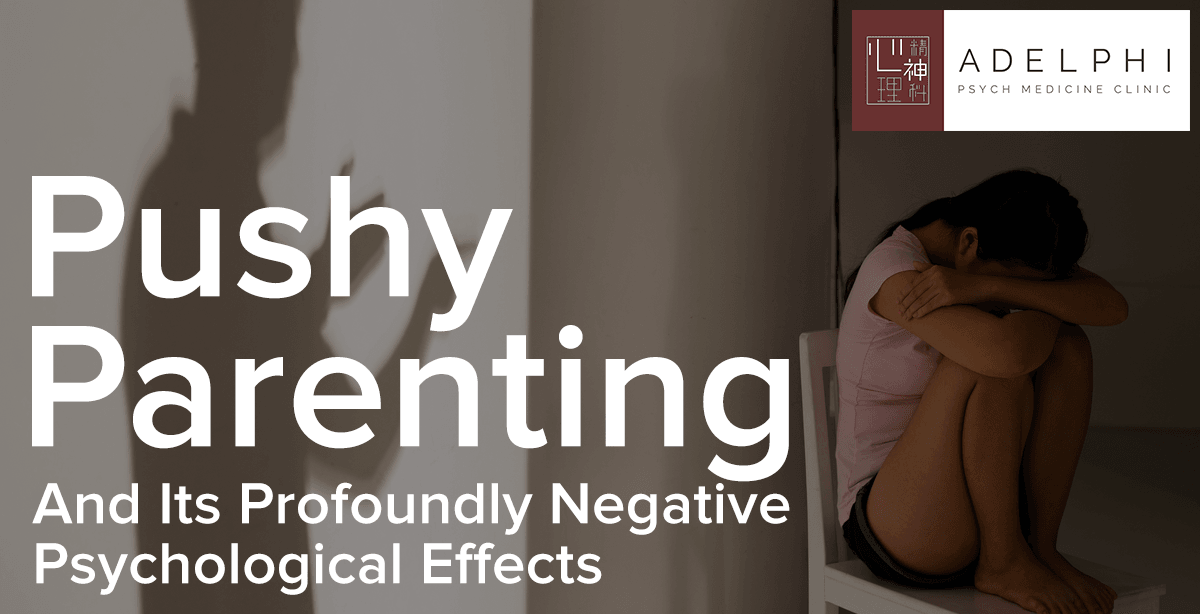
Mental health is such a delicate thing and nearly every stage of life can have an impact on one’s wellbeing later on in life. Needless to say, parenting choices can mould a lot more than the personality of a child. The responsibility is massive but some parents find themselves incapable of making the right decisions for their youngsters.
Pushy parenting may seem like a good idea when it comes to stimulating achievements. Many studies, however, suggest that pushy parenting can have profoundly negative psychological effects on a young and vulnerable individual. Over-involvement on behalf of parents has even been linked to a heightened risk of anxiety and depression.
The Evidence
The National University of Singapore Department of Psychology carried out a five-year study taking a deeper look at the manner in which pushy parenting could affect children.
Researchers found out that children who exhibit a high level of self-criticism also tend to suffer from more pronounced anxiety and depression than others. There’s a simple reason for that. Perfectionism on behalf of parents and being overly involved in the lives of children shows young individuals that their efforts are never good enough. As a result, a child may begin blaming themselves for not being perfect, which puts an excessive focus on one’s flaws.
During the first year of the study, the Singapore national university researchers attempted to identify the level of parent intrusiveness and its connection to high levels of self-criticism. The children were asked to play a game and assistance or involvement on behalf of the parents was examined.
Researchers found out that 60 per cent of the children involved in the experiment showed signs of high self-criticism.
There seems to be a huge disconnect between the ambitions of children and what their parents want. A British study provides additional evidence.
The study examined involvement in sports and whether the competitive element is seen as important by children. Of 1,000 children questioned in a survey, 64 per cent revealed that they would not be affected by the competitive element being removed from sports. At the same time, competition has been identified as a key reason why parents watch their children playing sports. Nearly 39 percent of the children questioned said that they felt their parents wouldn’t be interested in watching sports that don’t feature winners and losers.
Of the parents, 22 per cent admit they wouldn’t be interested in sports without the competitive element. And here’s how this belief affects the children – four out of 10 children were put off sports and athletic activities by the pushy behaviour of their parents.
Children Who Are Pushed Hard and the Risk of Depression
Childhood depression and anxiety are a real problem in Singapore. Psychologists report that children are subjected to high levels of stress and this stress comes from multiple sources. Academic workload, peer pressure , family problems and parents having unrealistic expectations can all contribute to psychological problems.
The prevalence of depression is estimated at two to 2.5 per cent of the adolescent population. Parents carry a serious responsibility because the need to encourage success could sometimes become excessive and even pathological.
Overzealous parents, however, achieve the exact opposite effect.
Success is dependent on the development of various skills – curiosity towards the world, optimism, a sense of personal capability and self-confidence. Such capabilities are developed through responsiveness and support on behalf of parents. Controlling and preoccupied individuals can kill the natural curiosity and the strive to get to know the world better. These will be replaced by worries about one’s performance.
On top of that, over-involvement on behalf of children prevents them from developing their own motivation. They become disinterested and detached, waiting for parents to set (unattainable) goals.
Research by Arizona State University academics shows that the children of parents who value achievements over kindness are more likely to be depressed. These children exhibited low levels of self-confidence and a more critical attitude towards their parents. Such children were also likely to act out more often than their peers who were not pushed as hard.
These effects are experienced in the formative years at a very young age, as well as when children become teenagers. The social implications of parental pushing are particularly bad for teenagers because achievements become a primary focus and connecting with others turns into a much more difficult task.
Seeking Assistance for Childhood Depression and Anxiety
Finding the balance between being supportive and encouraging children to perform to the best of their abilities can be a challenging task. When should a parent draw the line? When does normal concern become helicopter parenting – the micromanagement of every little aspect of the child’s life?
Positive motivation usually features support, encouragement and understanding. Motivation methods are tailored to the specific needs and interests of the child. Pushy parenting is about achievements at all costs, regardless of personal talents and desires. The repercussions of failure are also exaggerated, which contributes to worries, fear and anxiety.
It’s never too late to change – after all, you are being pushy to help your child. Recognising your own parenting mistakes is the first step towards encouraging change.
Work with a mental health clinic with the right experience will be the next step on the road to recovery.
Child counselling can be used to identify the cause of withdrawal, fear and anxiety in a young person. While talking to a psychiatrist or a psychologist in Singapore may seem like a troubling idea in itself in the very beginning, such a consultation can make a huge difference in terms of gaining some insight into the emotions and the fears of your child.
Anger, anxiety and depression can all be addressed by an experienced mental health professional. This is why you need to dedicate some time to identifying the right person to contact.
Adelphi Psych Medicine Clinic – Psychiatrists and Psychologists for Mental Health in Singapore has therapists who specialise in child counselling and who have many years of experience in the treatment of both young children and teenagers. Adelphi also provides therapy for individual adults, groups as well as marriage & family therapy. Please do not hesitate to get in touch with Adelphi and schedule your first appointment.
Article by Adelphi Psych Medicine Clinic


